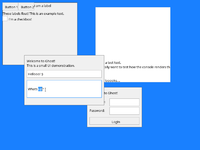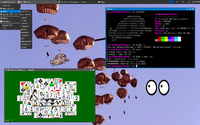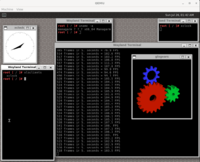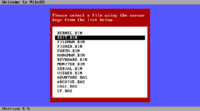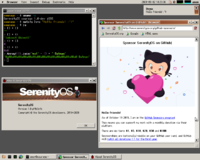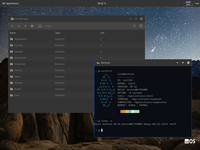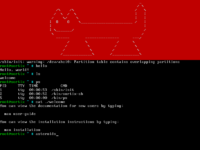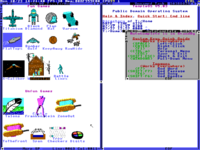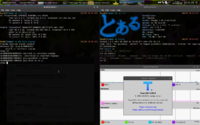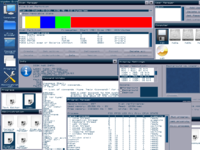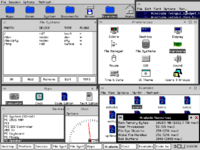Notable Projects
This page maintains a list of mature hobby operating system projects considered to be notable. A hobby operating system is considered notable if it made some considerable progress (e.g. has had a full release, is self-hosting, has been reported on outside of the hobby OSdev world, etc.) or if it has achieved such notability within the operating system development community as a useful answer to the question, "I want to see what kind of operating systems you guys have built". It should have a relatively stable kernel and drivers, and some userspace applications. They are usually written by the members of this community, but not limited to.
Everyone is welcome to add their own projects to the regular Projects list of all hobbyist operating systems.
More advanced and successful alternative operating systems are listed at Advanced Projects page.
Notable Hobby Operating Systems
BareMetalBareMetal is a 64-bit OS for x86-64 based computers. The OS is written entirely in Assembly while applications can be written in Assembly or C/C++. The two main purposes of BareMetal are for educational uses in learning low-level OS programming in 64-bit Assembly and to be used as a base for a high-speed data processing node. Source code is well documented and freely available. As of version 0.4.9 BareMetal OS officially supports multiple processors, memory management, and Ethernet communications. |
|
Ghost OSA homemade operating system with a microkernel for the IA32 (x86) platform. The project is written in C++ and Assembly. Features: multiprocessor- & multitasking support, kernel API library, custom C library, ELF support, IPC (messages, signals, shared memory, pipes), VFS, window server & GUI with homemade toolkit, PS/2 keyboard & mouse driver, VESA video driver and more... |
|
IroncladIronclad is a mostly formally verified hard real-time kernel written in SPARK and Ada. It is made to be 100% free software, free in the sense that it respects the user's freedom. It supports several architectures and features an advanced security model with features like Mandatory Access Control (MAC). The screenshot features Gloire, a distribution of Ironclad. |
|
KnightOSOpen-source operating system for Texas Instruments calculators. Features preemptive multitasking, memory management, etc. Written in z80 assembly. |
|
ManagarmManagarm is a 64-bit OS for x86-64. It’s written in C++ with a custom libc and a GNU like userland on top. Managarm’s main purpose is aiming for Linux compatibility while being completely asynchronous in terms of I/O. The OS is capable of running Weston and kmscon while effort is made into porting (a subset of) Xorg. Furthermore, Managarm supports many modern hardware devices, including USB 3 and has nearly full ACPI support. |
|
MikeOSMikeOS is an operating system for x86 PCs, written in assembly language. It is a learning tool to show how simple 16-bit, real-mode OSes work, with well-commented code and extensive documentation. It has a BASIC interpreter with 46 instructions, supports over 60 syscalls, could manage a serial terminal connection and output the sound through PC speaker. There is also a file manager, text editor, image viewer and some games |
|
PedigreeMonolithic OS with several backends supported - x86, x64, MIPS32, ARM and PowerPC. Kernel written in C++ with the obvious bits of ASM. Offers a reasonable amount of POSIX support and a tiling GUI and can run Apache, DOSBox, and various other common programs. Planned to also offer a native API alongside POSIX for Pedigree-specific applications. |
|
SeaOSSeaOS is a hybrid kernel with loadable modules that supports ATA, AHCI, EXT2, ELF, and many other fancy acronyms. It has basic networking support, initial VT-x support, and is self-hosting with a fairly complete unix-like userland. Designed for simplicity. |
|
SerenityOSSerenityOS is a graphical Unix-like OS written in C++. It combines a 1990's style GUI with a modern CLI. Everything is from scratch, including a web browser with JavaScript and HTTPS support. A growing number of 3rd party packages are available as optional ports, including GCC, bash, vim, Python, SDL2, etc. You can watch videos of the system being developed on YouTube: https://www.youtube.com/c/AndreasKling. |
|
skiftOSskiftOS is a hobby operating system built for learning and fun targeting the x86 platform. It features a kernel named hjert, a graphical user interface with a compositing window manager, and familiar UNIX utilities. |
|
SortixSortix is a small self-hosting operating-system aiming to be a clean and modern POSIX implementation. It is a hobbyist operating system written from scratch with its own base system, including kernel and standard library, as well as ports of third party software. It has a straightforward installer and can be developed under itself. Releases come with the source code in /src, ready for tinkering. |
|
TempleOSTempleOS is a 64 bit lightweight OS with multitasking and multicore support, which is ring-0-only and works in a single address space. It provides the interface for communicating with God: the user has to choose a random number from the constantly changing sequences and then it is converted to the text interpretation. Whole OS with its' software has been single-handedly created during 15 years by Terry A Davis - who also developed a programming language called Holy C together with a special compiler for it. TempleOS supports the FAT32 and RedSea filesystems (the latter created by Terry) and also the file compression. It doesn't support the networking, partially for ideological reasons, but there are forks available with added functionality |
|
ToaruOS64-bit modular kernel written in C. Supports pipes, shared memory, signals, POSIX-like VFS, threading, audio, IPv4. Heavy focus on advanced GUI, including a compositing window system. |
|
VisopsysVisopsys (VISual OPerating SYStem) is an alternative operating system for PC-compatible computers, written “from scratch”, and developed primarily by a single hobbyist programmer since 1997. Its primary "useful feature" is a reasonably functional partition management program - the ‘Disk Manager’, which can create, format, delete, resize, defragment, copy, and move partitions, and modify their attributes. It supports both DOS/MBR and UEFI partition tables. It can also copy hard disks, and has a simple and friendly graphical interface. A basic version can fit on a bootable floppy disk, or you can use the entire system from a ‘live’ CD/DVD |
|
Vanadium OSVanadium OS is a multi-user Unix-like OS. i386, amd64. Fully protected mode. Memory, file and hardware protection. root and unprivileged users. GUI without X, modular kernel, and has a live floppy image with a single user mode! My homepage: http://www.durlej.net/contact ; project pages: http://www.durlej.net/v/ , http://www.durlej.net/nameless , https://github.com/p-durlej/newsys . One of the great features is that you can write C code and instantly compile it to execute |
|
